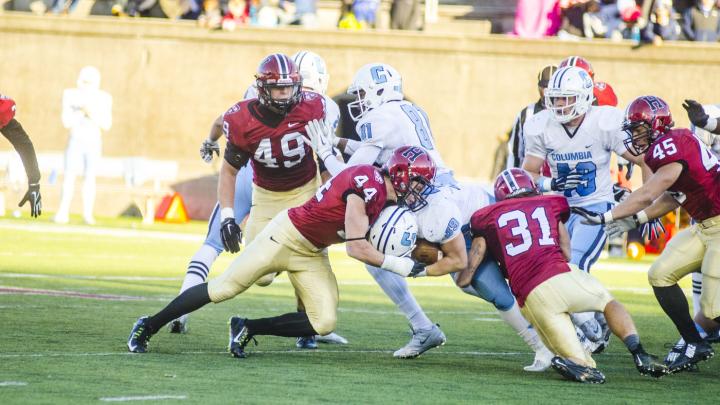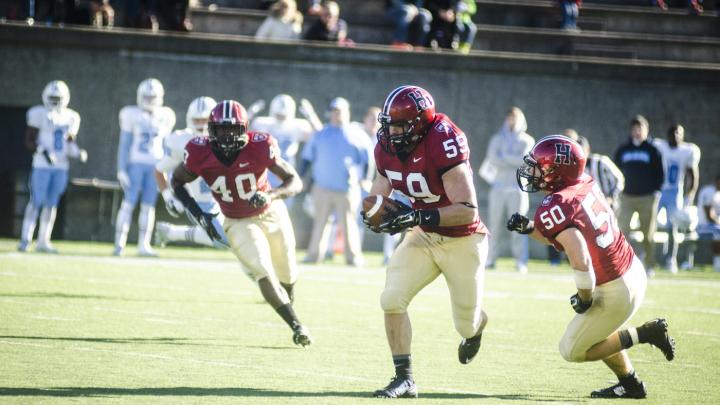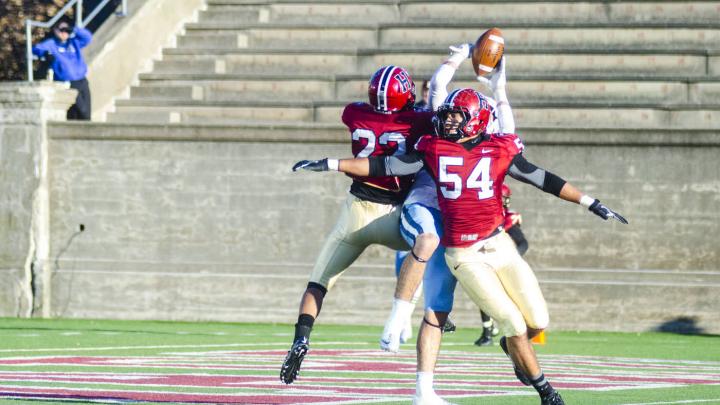Midway through the Harvard football team’s game against Columbia at the Stadium, ESPN3 (which was telecasting) began showing a Twinkies-eating contest (we kid you not) on an adjacent stream. A switchover was tempting: either way you’d see a cakewalk. With its top-ranked defense snacking on a six-pack of turnovers, the Crimson polished off the undermanned Lions 45-0 and remained unblemished in 2014.
The victory on a sunny and cold (46 degrees at kickoff) afternoon was the Crimson’s twelfth straight across two seasons, while the loss was the nineteenth in a row for Columbia (0-8, 0-5 in Ivy play in 2014). Harvard (8-0, 5-0) remained one game ahead of Dartmouth, Princeton, and Yale, each of which is 4-1 in the league. This shutout was Harvard’s third straight over Columbia; the Crimson tamed the Lions 69-0 in 2012 and 34-0 in 2013. (For us non-math concentrators, that’s 148-0 in three seasons.) Harvard has permitted foes a microscopic 9.4 points a game and leads the Football Championship Subdivision (FCS) in scoring defense.
Playing without starting quarterback Conner Hempel ’15, who was out with a shoulder injury suffered in last week’s 23-12 win at Dartmouth, the Crimson offense (440 total yards) was stop-and-start. But the defense, and especially the linebacking corps, was crackerjack. Three of Harvard’s touchdowns came on interception returns—a school record. Two of these so-called “pick sixes” were turned in by linebacker Connor Sheehan ’15, who tied the record that Dante Balestracci ’04 set against Dartmouth in 2000. A fourth touchdown was set up by a fumble recovery inside Columbia’s five-yard line. The turnovers made a mockery of the statistic supposedly among football’s most indicative: time of possession: the Lions won that battle, 37:14 to 22:46.
"We have a lot of football left, but clearly our identity is: we are a great defensive team right now,” said Harvard coach Tim Murphy after his 103d Ivy League win. “We rarely make mistakes, which is the most important thing. Really, we had no lapses today. And we have to play to that strength.” Twice before in Murphy’s 21-year tenure, in 2001 and 2004, the Crimson started 8-0; both times Harvard finished undefeated.
The Crimson’s only uneasy moment came on the game’s first play from scrimmage. When everyone unpiled after a Columbia run, Zack Hodges ’15, Harvard’s All-Ivy defensive end and career-sacks leader, stayed on the ground. Had he been badly hurt, the day would have been dark no matter what the score. Hodges got up and walked gingerly to the sideline. He returned later in the half and assisted on two tackles, to the relief of Harvard supporters.
The first points came two series after Hodges’s injury, on the kind of play that happens to bad teams. On third and two from Columbia’s 42, Lions quarterback Trevor McDonagh threw to wide receiver Ryan Flannery, who had run far enough for a first down. But the ball arrived at the same time as Harvard linebacker Eric Medes ’16. In the collision, the pigskin deflected to Sheehan, who alertly gathered it in at the 48, then ran untouched down the left side to the Lions goal. Andrew Flesher ’15 kicked the extra point. Harvard 7, Columbia 0. (And thus the Crimson had taken care of another piece of business: extending its Ivy-record streak of not being shut out to 166 games.)
“That was a gift,” said Sheehan afterward. “I was just really fortunate that it came to me. Eric Medes made quite a hit.”
Later in the quarter, behind the running of Paul Stanton Jr. ’16 and Semar Smith ’18, Harvard carried the ball down to the Columbia 32—where the Lions stuffed Smith on fourth and three. Columbia took over and it proved to be a case of “Be careful what you wish for.” On third down, McDonagh threw the ball over the middle—directly into the hands of Crimson linebacker Matt Koran ’16, who was sitting back at the 34. Koran followed the path earlier blazed by Sheehan and scored. Harvard 14, Columbia 0.
The second quarter brought the season’s most boneheaded play. A punt by David Bicknell ’15 pinned the Lions inside their 10. They chose this unlikely time and place—second down from their five—to try some trickery. McDonagh threw to Marcus Briscoe, who attempted to pitch it back to McDonagh. The ball instead fluttered to the turf, from which Harvard linebacker Eric Ryan ’17 (a team-leading 10 tackles) pounced on it and took it to the one. From there, Stanton scored. Harvard 21, Columbia 0. If there ever was a play that symbolized the Lions’ continued futility—Exhibit A of When Bad Teams Make Stupid Decisions—this was it.
Things could have—should have—gotten worse. The Lions made another fourth-down stop, swallowing up Crimson quarterback Scott Hosch ’16 at their 24. Then, after a sack of McDonagh by defensive lineman Miles McCollum ’17, Harvard defensive back Ryan Jones ’15 blocked a punt by Cameron Nizialek. Defensive back Tobe Ezeokoli, a very frisky freshman, recovered on the nine. However, the Crimson possession ended with Flesher hooking (wide left) a 24-yard field goal attempt, continuing Harvard’s vexing difficulty with supposed chip-shot three-pointers.
As on other days, this was a mere hiccup. With 1:13 left in the half, Harvard got the ball back on its own 41. It took two plays and 15 seconds to take the ball the 59 yards into the Columbia end zone. On one of his trademark cutbacks, Stanton (using the referee as a slalom pole) rumbled for 22 yards. Then quarterback Hosch dropped back and saw receiver Seitu Smith ’15 (Semar’s big brother) running a down-and-in pattern on the right side. Hosch delivered the ball and Smith took it over the goal line. At the half, Harvard 28-0.
To start the second half, Stanton sat down and Semar Smith took over at running back. If anything, the freshman ran even harder. On the opening drive, Smith accounted for 51 of Harvard’s 75 yards via rushes and receptions, finally barging into the end zone from the three. Harvard 35, Columbia 0. On the day, Semar Smith would lead the Crimson with 114 yards on only 11 carries which, for the non-math concentrators, gave him a gaudy 10.4 yards-per-carry average.
The scores by the Smith brothers begged three questions: Are they the first Crimson brothers to score in the same game? Are they even the first Crimson Smith brothers to score in the same game? (Best other possibility: Perry Smith, A.B. 1911, and L.D. [Bud] Smith, A.B. 1912.] Research on these vital matters is ongoing. Finally: are there any more football-playing Smith brothers in Florida where Seitu and Semar come from?
More than 27 minutes of play remained. Your correspondent wrote in his notes, “This could get very ugly!” The next series provided evidence of his genius. On third-and-eight at the Columbia 41, McDonagh flipped one to the right. There, at the Columbia 49, was Connor Sheehan, who picked off the pass. With a spin move that would have done credit to Michael Jackson or Michael Jordan, he started upfield and did not stop until he crossed the goal line. Harvard 42, Columbia 0.
“I just ended up being in the right place at the right time, and all my teammates ended up making incredible blocks,” said Sheehan. “[Defensive back and captain] Norman Hayes [’15] made a block right at the start, [linebacker] Jake Lindsey [’16] had another great one to spring me, then right before the end, Zack Hodges had another great block while I was cutting back. I might get the credit for the score individually but all those guys put in a lot of work to make it happen.”
After the game, Columbia coach Pete Mangurian rhetorically threw up his hands. “I've been doing this a long time, and I've never seen a game like that—28 points off turnovers,” he said. “Obviously that changed the whole complexion of the game. When you play a good team and have lapses, bad things happen.” (True, but Mangurian’s team was like a bad golfer who follows good shots with shanks that put him in purgatory.) Mangurian was effusive in his praise of Harvard's defense: “They line up and they do what they do, and they wait for you to make mistakes. They wear you down, the dam breaks, and the game gets out of hand.”
With third-string quarterback Joseph Viviano III ’17 running the show (and Semar Smith doing some more running), the Crimson scored three more points, on a 24-yard field goal by Ben Falloon ’15—an attempt that was perhaps practice for a moment in which a boot really will be needed. There was no more scoring, but the Crimson forced two more turnovers, a fumble recovery by Ryan Jones and an interception by defensive back Tim Haehl ’18 that snuffed the Lions’ desperate hope of getting something on the board.
Upon his graduation in June, Sheehan, a history and science concentrator from Austin, Texas, hopes to join the military and enter officer candidate school with the aim of joining a special ops outfit. (Linebacking would seem to embody ideal training.) But first he has two more opponents to search and destroy. “We’re focused on Penn,” he says, “but when the time comes for Yale, everyone’s gonna be all in, focused, dialed in, and ready to get after it for that final game.”
Weekend roundup
Yale 45, Brown 42
Dartmouth 42, Cornell 7
Princeton 22, Penn 17
Coming up: Next Saturday, Harvard plays Penn in Philadelphia. Kickoff: 1 p.m. (The game will be televised on the Ivy League Digital Network.) The Quakers are 1-7 overall and 1-4 in Ivy play. The first game between these rivals was played in 1881 (Harvard 2, Penn 0); Harvard leads the series 47-35-2. Since the formation of the Ivy League in 1956, the Crimson is 34-23-1 against Pennsylvania. Last year at the Stadium, Harvard outlasted the Quakers, 38-30.
A victory would assure the Crimson of no worse than a share of the Ivy title. The Quakers are the toughest 1-7 foe imaginable. They gave a very good account of themselves last Saturday at Princeton. More to the point, Penn will want to win one for their Gipper: coach Al Bagnoli, who is retiring after 23 seasons that include nine Ivy titles. This will be Bagnoli’s final game at Franklin Field and a memorable upset of the Crimson would redeem Penn’s season.
There also will be some serious scoreboard watching. Princeton is at Yale in a virtual elimination game, while Dartmouth hosts feisty Brown.
Score by quarters
Columbia 0 0 0 0 0
Harvard 14 14 17 0 45
Attendance: 12,552











